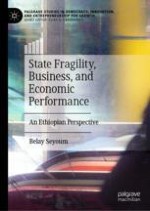2024 | OriginalPaper | Buchkapitel
4. The Economy in Fragile States
verfasst von : Belay Seyoum
Erschienen in: State Fragility, Business, and Economic Performance
Aktivieren Sie unsere intelligente Suche, um passende Fachinhalte oder Patente zu finden.
Wählen Sie Textabschnitte aus um mit Künstlicher Intelligenz passenden Patente zu finden. powered by
Markieren Sie Textabschnitte, um KI-gestützt weitere passende Inhalte zu finden. powered by
